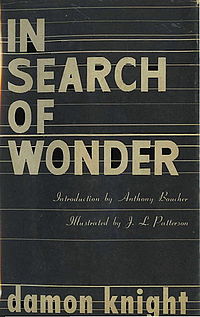- In Search of Wonder
-
In Search of Wonder 
First edition coverAuthor(s) Damon Knight Illustrator J. L. Patterson Country United States Language English Genre(s) Science fiction Literary criticism Publisher Advent Publication date 1956 Media type Print (Hardback) Pages 180 ISBN 9780911682311 In Search of Wonder: Essays on Modern Science Fiction is a collection of critical essays by Damon Knight. Most of the material in the book was originally published between 1952 and 1955 in various science fiction magazines including Infinity Science Fiction, Original SF Stories, and Future SF. The essays were highly influential, and contributed to Knight's stature as the foremost critic of science fiction of his generation.[1] The book also constitutes an informal record of the "Boom Years" of science fiction from 1950-1955.
In the opening chapter, Knight states his "credos", two of which are:
- That science fiction is a field of literature worth taking seriously, and that ordinary critical standards can be meaningfully applied to it: e.g., originality, sincerity, style, construction, logic, coherence, sanity, garden-variety grammar.
- That a bad book hurts science fiction more than ten bad notices.
Perhaps the most famous essay in the book is "Cosmic Jerrybuilder: A. E. van Vogt", a review of the 1945 magazine serialization of A.E. Van Vogt's The World of Null-A, in which Knight "exposed the profound irrationality lying at the heart of much traditional science fiction".[2]
In 1956 Knight was awarded a Hugo as "Best Book Reviewer" based largely on the essays reprinted in this book.
Contents
Quotes
On defining science fiction:
- "Science fiction ... means what we point to when we say it." (1st ed., p. 1)
On criticism:
- "Why should anybody rip a bad work of art to shreds? Why, to find out how it is made." (1st ed., p. 14)
On science fiction writers:
- A. E. van Vogt "is no giant; he is a pygmy who has learned to operate an overgrown typewriter." (1st ed., p. 50)
- "[Ray] Bradbury's subject is childhood and the buried child-in-man; his aim is to narrow the focus, not to widen it; to shrink all the big frightening things to the compass of the familiar: a spaceship to a tin can; a Fourth of July rocket to a brass kettle; a lion to a Teddy bear." (1st ed., p. 77)
On science fiction novels:
- I Am Legend by Richard Matheson "is full of good ideas, every other one of which is immediately dropped and kicked out of sight." (1st ed., p. 51)
- "The Blind Spot, by Austin Hall and Homer Eon Flint, is an acknowledged classic of fantasy, first published in 1921; much praised since then, several times reprinted, venerated by connoisseurs - all despite the fact that the book has no recognizable vestige of merit." (1st ed., p. 14)
On British writers:
- "The only thing worse than a bad American novel is a bad British one." (1st ed., p. 71)
Contents
Following is a list of chapters in the first edition (1956).
- Introduction by Anthony Boucher
- Author's Note
- Critics
- The Classics
- Chuckleheads
- Campbell and His Decade
- Cosmic Jerrybuilder: A. E. van Vogt
- Half-Bad Writers
- One Sane Man: Robert A. Heinlein
- Asimov and Empire
- More Chuckleheads
- When I Was in Kneepants: Ray Bradbury
- The Vorpal Pen: Theodore Sturgeon
- Anthologies
- Genius to Order: Kuttner and Moore
- Kornbluth and the Silver Lexicon
- The Jagged Blade: James Blish
- Overalls on Parnassus: Fletcher Pratt
- Microcosmic Moskowitz
- New Stars
- Curiosa
- The Giants
- Pitfalls and Dead Ends
- What next?
- Bibliography
- Index
The second edition (Advent, 1967) included the additional chapters:
- Half Loaves
- Amphibians
- B-R-R-R!
- Decadents
- Britons
- Symbolism
"Symbolism" is chapter-long essay on the symbolism in James Blish's short story Common Time, first published in a 1967 issue of Science Fiction Forum.
Reception
Reviewing the second edition, Algis Budrys declared that "Damon Knight sets an as yet unequalled standard" for sf criticism and praised Knight both for "his exact appreciations of the well done" as well as "how influential [he] was when summing up the subtle but suddenly obvious flaws in work that had seemed pretty good."[3]
References
- ^ Gunn, James, ed (2003). The Road to Science Fiction, Volume 4: From Here to Forever. Scarecrow Press.
- ^ Clute, John (April 17 2002), "Damon Knight: Intellectual gadfly of science fiction", The Independent, http://www.independent.co.uk/news/obituaries/damon-knight-729929.html
- ^ "Galaxy Bookshelf", Galaxy Science Fiction, December 1967, pp.187-89
External links
- In Search of Wonder publication history at the Internet Speculative Fiction Database
Categories:- 1956 books
- Books of literary criticism
- Hugo Award winning works
- Works by Damon Knight
Wikimedia Foundation. 2010.
